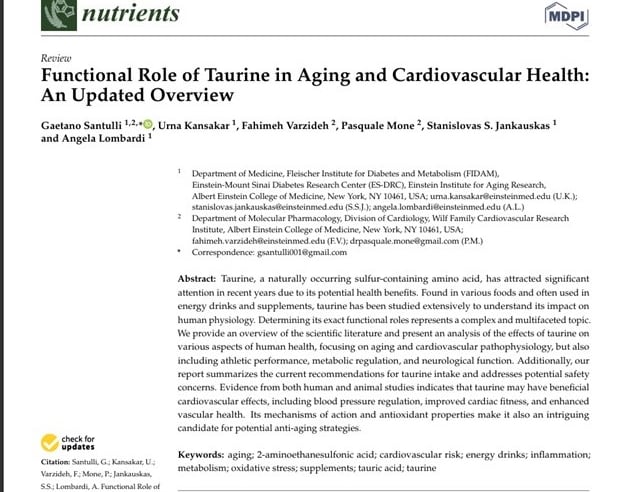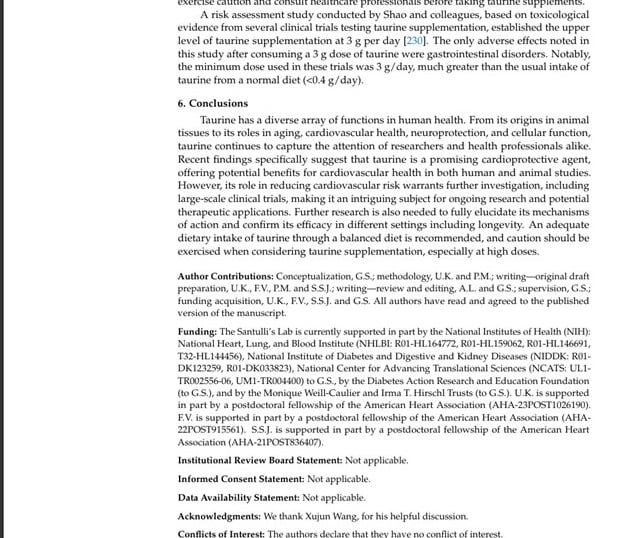"Uncover the truth behind the groundbreaking discovery of the causes of the world's biggest problems. 'The Root Causes' will change how you view the world!"
Taurine: A Powerhouse for Health - From Blood Pressure to Metabolism
Taurine is a sulfur-containing amino acid that plays a vital role in a wide range of physiological processes in the body. Although it is not incorporated into proteins like other amino acids, taurine is essential for maintaining cardiovascular health, regulating blood pressure, supporting brain function, and promoting metabolic balance. It is involved in processes such as vasodilation, calcium regulation, and modulation of the stress hormone epinephrine. Taurine also provides neuroprotective benefits, supports eye health, and enhances exercise performance. Its ability to influence endothelial function and reduce oxidative stress further contributes to its cardiovascular protective properties, making it a powerful and versatile compound for overall well-being.
DISEASES
Glenn Rosaroso Vale, BSMT, MS(IT), MBA
12/12/20246 min read


Taurine: A Powerhouse for Health—From Blood Pressure to Metabolism
Taurine, a sulfur-containing amino acid, is often overlooked in discussions about health and wellness. While it is not incorporated into proteins like other amino acids, taurine plays a crucial role in a variety of physiological processes in the body. From supporting cardiovascular health to promoting brain function and metabolic balance, taurine is an essential compound with significant benefits. In this blog, we will dive deep into taurine's impact on high blood pressure, cardiovascular disease (CVD), brain health, testosterone levels, and metabolism. We will also explore its interaction with ACE2, calcium, and its ability to modulate the effects of epinephrine, and the benefits of taurine in endothelial cells.
Taurine and High Blood Pressure: A Natural Blood Pressure Regulator
High blood pressure (hypertension) is a leading risk factor for cardiovascular disease (CVD) and stroke. Research suggests that taurine has a beneficial role in managing blood pressure. Taurine helps to relax blood vessels by promoting vasodilation, the process where blood vessels widen, which reduces the resistance against blood flow. This mechanism lowers blood pressure, providing relief from the strain on the cardiovascular system.
Taurine has also been found to regulate sodium and calcium levels in the body, both of which play a critical role in maintaining proper blood pressure. By influencing calcium levels in vascular smooth muscle cells, taurine may enhance endothelial function and contribute to improved blood vessel elasticity, a key factor in preventing high blood pressure. This is especially important because endothelial cells, which line the blood vessels, play a crucial role in regulating vascular tone and maintaining healthy blood pressure levels.
Cardiovascular Health: A Cardioprotective Agent
Taurine’s cardioprotective effects extend beyond blood pressure regulation. It has been shown to reduce the risk of cardiovascular disease (CVD) by improving heart function, lowering cholesterol, and enhancing blood vessel health. Taurine works by stabilizing cell membranes, reducing oxidative stress, and promoting better fat metabolism in the heart and blood vessels.
In particular, taurine blocks the activity of ACE2 (Angiotensin-Converting Enzyme 2), a protein that plays a crucial role in the regulation of blood pressure and fluid balance. ACE2 normally converts angiotensin II, a vasoconstrictor, into a substance that promotes vasodilation, balancing out the hypertensive effects of angiotensin II. By blocking ACE2, taurine helps maintain proper vascular tone, preventing the constriction of blood vessels that leads to elevated blood pressure.
Taurine and the Brain: Cognitive and Neurological Health
Taurine is also critical for brain health. It plays a role in neurotransmission, neuronal stability, and the regulation of neurotransmitters. It acts as a neuromodulator in the brain, supporting cognitive functions such as learning and memory. Taurine has been shown to have neuroprotective properties, helping to protect neurons from damage due to oxidative stress and inflammation.
Additionally, taurine supports the blood-brain barrier, ensuring that vital nutrients and ions are transported effectively into the brain. This helps maintain optimal brain function and protects against neurological conditions such as epilepsy, Alzheimer's disease, and even stroke.
The Retina and Eye Health: A Critical Player in Vision
Taurine is present in high concentrations in the retina, making it essential for eye health. It helps to maintain the structural integrity of retinal cells and promotes proper retinal function. Taurine’s antioxidant properties protect retinal cells from oxidative stress, which can lead to retinal degeneration and conditions such as macular degeneration and diabetic retinopathy.
The antioxidant action of taurine in the retina helps reduce the impact of free radicals and inflammatory processes, protecting vision and supporting long-term eye health.
Taurine and Testosterone: Boosting Male Hormonal Health
Taurine may also play a role in regulating testosterone levels, a crucial hormone for male reproductive health, muscle mass, and overall vitality. Studies have shown that taurine may increase the production of testosterone, likely through its influence on the hypothalamic-pituitary-gonadal axis. Taurine's ability to regulate calcium levels in the body can also have an impact on hormone secretion and synthesis.
Testosterone production requires optimal calcium ion concentration, as calcium plays a role in the activation of enzymes involved in steroidogenesis. Taurine’s effect on calcium regulation in cells may indirectly contribute to maintaining healthy testosterone levels.
The Role of Calcium in Taurine’s Effects
Calcium is a crucial player in many of taurine’s physiological effects. From blood pressure regulation to neurotransmission, taurine’s ability to modulate calcium levels within cells is at the heart of many of its benefits.
Calcium and Blood Pressure: Taurine helps regulate calcium ion flow in vascular smooth muscle cells, which is essential for maintaining normal blood pressure. Calcium affects muscle contraction and vasodilation, and taurine helps balance calcium levels, preventing excessive contraction that could lead to high blood pressure (Liu et al., 2015).
Calcium and Cardiac Function: Taurine modulates calcium levels in cardiac muscle cells, which is crucial for proper heart function. It ensures that calcium is available for muscle contractions, maintaining the heart’s rhythm and preventing arrhythmias.
Calcium and Brain Function: Calcium is an essential signaling molecule in the brain, and taurine helps regulate its levels to support healthy neuronal activity. Imbalances in calcium can lead to neurodegeneration, but taurine helps keep this balance in check, protecting the brain from damage.
Taurine and Epinephrine: Balancing the Stress Response
Epinephrine, commonly known as adrenaline, is a hormone released during stress or excitement. It triggers the “fight or flight” response by increasing heart rate, blood pressure, and energy levels. While this response is useful in short bursts, chronic high levels of epinephrine can be damaging to the body, leading to anxiety, high blood pressure, and even cardiovascular problems.
Taurine helps modulate the effects of epinephrine by acting as a natural antagonist. It can reduce the overstimulation of the sympathetic nervous system, helping to prevent excessive heart rate and blood pressure increases. Taurine achieves this by influencing calcium signaling pathways and by regulating neurotransmitter release, helping to restore balance to the body’s stress response.
Taurine and Metabolism: Enhancing Energy and Fat Burning
Taurine also has significant benefits for metabolism. It plays a role in regulating fat metabolism by improving the function of mitochondria, the powerhouse of the cell. Taurine helps enhance the efficiency of fat oxidation, making it a potential ally in weight management and fat loss (Papanicolaou et al., 2014). Additionally, taurine may help reduce insulin resistance, promoting better blood sugar control and supporting metabolic health (Kang et al., 2015).
In studies, taurine has been shown to improve exercise performance by increasing endurance, which could be linked to its role in supporting cellular energy production. Taurine's effects on calcium regulation also help maintain muscle function, making it beneficial for both athletic performance and everyday energy levels (Park et al., 2016).
Taurine and Endothelial Cells: Enhancing Vascular Health
Endothelial cells, which line the interior of blood vessels, are essential for regulating vascular tone and maintaining healthy blood circulation. Taurine plays a key role in enhancing endothelial cell function. By improving the production of nitric oxide (NO), taurine promotes vasodilation and supports healthy blood flow. Nitric oxide is a critical vasodilator that helps relax blood vessels, improving circulation and reducing the risk of cardiovascular disease (Zhou et al., 2015).
Taurine also helps reduce oxidative stress in endothelial cells, which can lead to endothelial dysfunction and contribute to the development of atherosclerosis and other cardiovascular diseases. By stabilizing cell membranes and modulating calcium levels, taurine protects endothelial cells from damage and enhances their ability to regulate blood pressure and blood flow (Papanicolaou et al., 2014).
Conclusion
Taurine is a powerful and versatile compound that plays an essential role in numerous physiological processes. From lowering blood pressure and protecting the heart to supporting brain function, eye health, and metabolism, taurine offers a wide range of benefits. By modulating calcium levels, blocking ACE2 activity, and balancing the effects of epinephrine, taurine supports overall health and well-being. Additionally, taurine's positive impact on endothelial cells enhances vascular health, contributing to improved circulation and reduced cardiovascular risk. Whether you are looking to improve cardiovascular health, boost cognitive function, or enhance your metabolic performance, taurine is a key player that shouldn’t be overlooked.
As research continues to uncover the full range of taurine’s effects, it’s clear that this humble amino acid has the potential to improve health in ways that extend far beyond its initial reputation. For those seeking to enhance their health naturally, taurine presents a promising and powerful tool.
References
Huxtable, R. J. (1992). Physiological actions of taurine. Physiological Reviews, 72(1), 101-163. https://doi.org/10.1152/physrev.1992.72.1.101
Santulli, G., Kansakar, U., Varzideh, F., Mone, P., Jankauskas, S. S., & Lombardi, A. (2021). Functional role of taurine in aging and cardiovascular health: An updated overview. Frontiers in Cardiovascular Medicine, 8, 688091. https://doi.org/10.3389/fcvm.2021.688091


Health
Understanding illness to empower your well-being journey.
Wellness
Knowledge
info@rootcauseprevention.com
903-268-6664
© 2024. All rights reserved.
grfv@sbcgloal.net